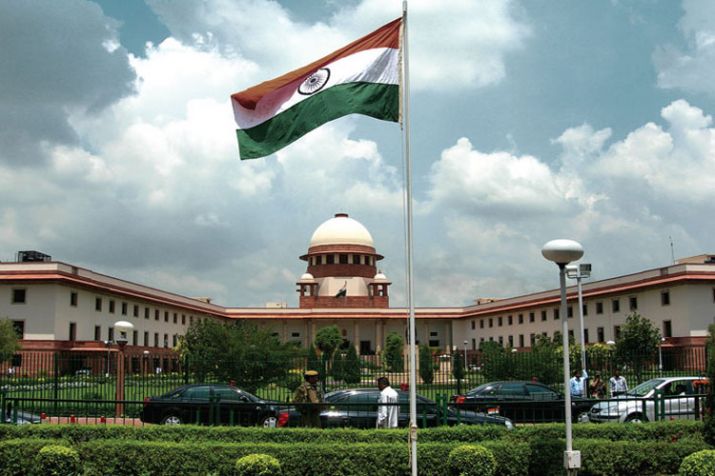The Supreme Court is likely to hear petitions on Article 35A this week, between February 26-28, a case that questions the validity of the Article35A, but is critical for peace, law and order in the state of Jammu and Kashmir. NGO, We the Citizen, filed a writ petition challenging the validity of Article 35A and Article 370. According to them, four representatives were part of the Constituent Assembly involved in the drafting of the Constitution and the state of Jammu and Kashmir did not receive any special status.
Article 370 is supposed to be ‘temporary provision’ aimed at bringing normality and strengthening democracy in the state of Jammu and Kashmir. It wasn’t meant to be a tool to bring in permanent amendments like Article 35A.
The petition further argues that the article was against the concept of ‘the spirit of oneness in India’ by creating a ‘class within a class of Indian Citizens’. The article restricts citizens in other states from getting employment or buying property in Jammu and Kashmir, which is a violation of a citizen’s fundamental rights under Articles 14, 19 and 21 of the Constitution.
WHAT IS ARTICLE 35A? ALL YOU NEED TO KNOW
Article 35A is a provision in the constitution of India that grants the Jammu & Kashmir Legislature absolute freedom to decide who the ‘permanent residents’ of the state are, and grant them special rights and privileges. The privileges range from public sector jobs, property acquisition from the state and university scholarships to other public aid and welfare programmes.
This provision further mandates that no act of legislation coming under it can be challenged for violating the Constitution or any other law of the land.
Article 35A was incorporated into the constitution in 1954 by the then President Dr Rajendra Prasad on the advice of the Jawaharlal Nehru cabinet. The Constitution (Application to Jammu and Kashmir) Order of 1954 followed the Delhi Agreement of 1952 and was agreed upon by Nehru and the then Chief Minister of Jammu and Kashmir, Sheikh Abdullah.
The agreement allowed the extension of Indian citizenship to the ‘state subjects’ of Jammu and Kashmir.
A Presidential Order was issued under Article 370 (1) (d) of the Constitution which allowed the President to make certain ‘exceptions and modifications’ to the constitution for the benefit of ‘State subjects’ of Jammu and Kashmir.
Article 368 (i) of the Constitution empowers only the Parliament to amend the constitution. Article 35A was incorporated into the Constitution by the President, raising the question of whether he acted outside his jurisdiction. Another question that was raised was whether the article was void since the Nehru government incorporated it without presenting it in the Parliament for discussion.
In March 1961, a five-judge panel discussed the President’s powers under Article 370 to ‘modify’ the Constitution in the ‘Puranlal Lakhanpal vs. the President of India’ discussion. Though the court observed the President’s power to ‘modify’ an existing provision, the judges were silent as to whether the President can introduce a new article into the Constitution without the knowledge of the Parliament.
Now, the Top Court is set to hear the plea on the same writ petition.
However, there have been massive reactions coming from the valley in support from the Article 35A. Former Chief Minister and Peoples Democratic Party Chief Mehbooba Mufti said that scrapping the article will be a disaster. She said in a series of a tweet, ‘tampering with Article 370 and Article 35A will render the Treaty of Accession null and void’.
She added, ‘Valley rife with speculation about the status of Article 35. Before taking a decision, GoI (Government of India) must consider- 1. Jammu and Kashmir was the only Muslim majority state that chose a secular India over Pakistan during partition. 2. Article 370 is the constitutional connection between Jammu and Kashmir & Indian Union. 3. The instrument of accession is contingent on Article 370 which is inextricably linked to Article 35 A. 4. Any tampering will render the Treaty of Accession null & void.
Warning the authorities, she said in another tweet, ‘Those frothing at the mouth & calling for its removal shouldn’t blame Kashmiris for the developments that will follow such a hare-brained decision’.
Valley rife with speculation about status of Article 35. Before taking a decision, GoI must consider-
1. J&K was the only Muslim majority state that chose a secular India over Pak during partition.
2. Article 370 is the constitutional connection between J&K & Indian Union.— Mehbooba Mufti (@MehboobaMufti) February 24, 2019
5. Those frothing at the mouth & calling for its removal shouldnt blame Kashmiris for the developments that will follow such a hare brained decision.
— Mehbooba Mufti (@MehboobaMufti) February 24, 2019
While Jammu and Kashmir Governor Satyapal Malik called for calm and not to believe rumours. He said as quoted by PTI, ‘Rumours about curfews and other actions should not be believed. There is some security related action being taken by the forces, but this is purely related to the Pulwama attack which is unprecedented one’.
While Ahead of the crucial hearing Government deployed an additional 100 companies of paramilitary forces in Jammu Kashmir. Separatist Leader Yasin Malik, Several Others Detained by Jammu and Kashmir Police Ahead of SC Hearing on Article 35A.
ALSO READ:
- Separatist Leader Yasin Malik, Several Others Detained by J&K Police Ahead of SC Hearing on Article 35A
- Government deploys additional 100 companies of paramilitary forces in Jammu Kashmir
- Pulwama terror attack: Donald Trump extends full support in probing, counter-terrorism operation including UN

